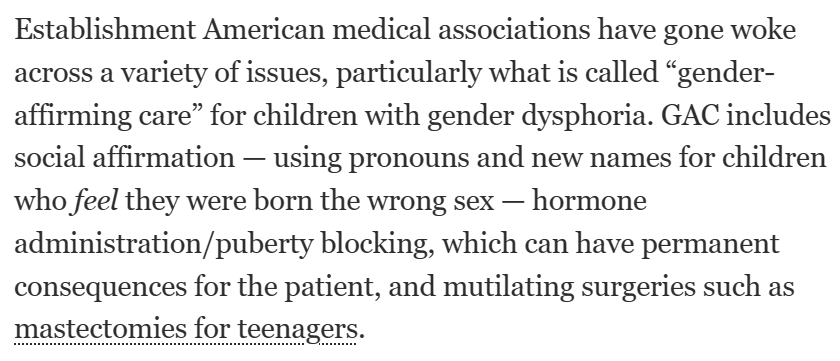Pediatricians’ Support for Gender Care Spun as Pull-Back by NYT, National Review
The American Academy of Pediatricians voted unanimously to continue to support gender affirming care for gender dysphoria, but some outlets are implying that a proposed evidence-review constitutes some kind of reversal.
by Evan Urquhart
The board of directors for a professional association representing mainstream pediatricians in the U. S. voted unanimously to reaffirm the 2018 decision to support transgender youth, according to the Associated Press and other outlets. In 2018, the American Academy of Pediatricians recommended that providers take a nonjudgmental approach towards gender variance as the best way to support families with children who identify as transgender. The published decision also described a range of potential interventions that could form an individualized treatment plan encompassing a range of options from social transition to talk therapy to medical interventions such as puberty blockers or cross-sex hormones. The current vote re-ups that decision while proposing to create more detailed recommendations for providers, which will be made after a systematic review of the evidence.
Publications that have engaged in an editorial crusade against gender-affirming care, including the National Review and the New York Times, reacted strangely to the news, citing the systemic review as some sort of pull-back despite the fact that the academy voted to re-endorse the 2018 decision. The National Review called it a “half-step back” from gender affirming care in an article which misrepresented events in Europe where the very political forces that have resulted in bans in the U. S. have succeeded in limiting treatment options for some youth in certain countries, and quoted one of the fringe medical practitioners who failed to convince a federal judge that a gender-affirming care ban in Arkansas was constitutional. They also misrepresented what gender-affirming care is, representing rarer medical interventions, such as puberty blockers, and vanishingly rare ones, such as surgeries, as necessarily part of the treatment for all young people.
One internal review of a gender clinic that was accused of providing hormone therapy to every patient found that fewer than half the youth seen by the clinic had received them, while barely over 50 percent had received either hormone therapy or puberty blockers.
Joining the National Review in its misleading spin was the New York Times, which published an article by Azeen Ghoryashi that similarly painted a systemic review as indicative of a change of direction. In a piece headlined “Medical Group Backs Youth Gender Treatments, but Calls for Research Review,” Ghoryashi used quotes from a Canadian researcher who has been critical of gender-affirming care as well as an activist and pediatrician who has lobbied against it for years to support this framing. The Times story also included a reference to two of the four European countries that have become mainstays in anti-trans propaganda. The result was an article which paints the decision to conduct a review of the evidence around gender-affirming care as a vindication for activists who oppose the mainstream consensus, which is in fact based firmly in the medical evidence.
Ghoryashi’s choices throughout the piece are troubling, because she allows activists who have long lobbied against a mainstream medical practice to claim the mantle of evidence-based medicine. This misleading framing privileges these activist’s messaging over the truth, which is that mainstream consensus formed under the slow accrual of evidence in favor of gender-affirming practices.
Anti-trans activists have waged a well-documented disinformation campaign to undermine the public’s trust in mainstream medical treatment for gender dysphoria because they oppose transition on ideological grounds. Ghoryashi’s framing helps further this ongoing project. In truth, no one who supports transgender people has come out in opposition to the academy’s review. Supporters of trans people and trans youth do so because they believe the evidence supports the mainstream practice. It is only anti-trans activists who have posited a conspiracy to push transition on young children willy-nilly.
There is no reason to imagine that a systemic review will change anything. Several new studies have come out since 2019 and have only increased the evidence base for the safety and efficacy of interventions such as puberty blockers and cross-sex hormones in the five years since the American Academy of Pediatrics endorsed them as appropriate in some individualized cases. There have been no new studies that found these treatments are harmful, no new evidence supporting fringe theories that the gender-identity of youth seeking such treatments has being shaped by social factors, absolutely no evidence that alternative treatments for gender dysphoria produce better outcomes than the mainstream treatments, and therefore no reason to imagine a systemic review will result in any change of course for the academy. No one who supports the mainstream consensus has come out against a systemic review, and no one who supports the mainstream consensus opposes the principle that treatments for medical conditions ought to be based in medical evidence.
A statement by a major medical organization in support of the current mainstream practices paired with a commitment to review the evidence in order to produce clearer guidance is, simply put, not any sort of win for those opposed to the mainstream consensus. By allowing activists to frame it as if it was a win is irresponsible for a journalist. By joining the National Review in their choice of framing the Times is demonstrating, once again, their inability to produce unbiased reporting on this issue.




